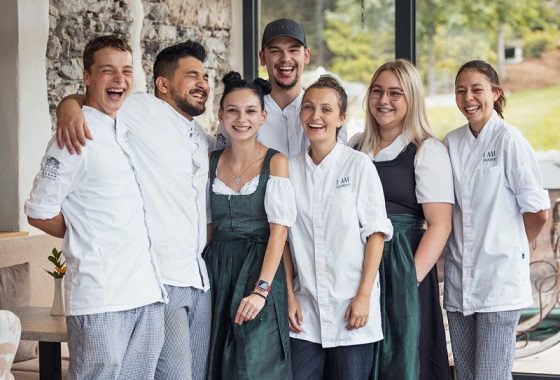 Training in the Hotel Industry – Overtime and Lack of Quality.
Training in the Hotel Industry – Overtime and Lack of Quality.
When it comes to training, the hospitality industry paints a bleak picture. Hoteliers have been crying out over the lack of prospective trainees for years. Existing apprenticeships are not being filled, and the industry’s reputation is more than just tarnished. The latest apprenticeship report from the German Federation of Trade Unions, for which ordinary young people were asked about their apprenticeship, confirms this.
In almost all points considered, but especially in the quality of training and overtime, the hospitality apprenticeships for hotel managers and chefs scored the worst. Accordingly, both professions ranked poorly in the overall assessment.
No wonder only half of the surveyed hotel management trainees are satisfied with their training. For comparison: industrial mechanics, at the top end of the list, have over 80 per cent satisfaction.
Something Needs to Change.
In addition to the lack of trainees, more and more skilled workers are leaving, especially in the industrial sector, notes the STURM in the Bavarian Rhön. “A calculation that does not balance and, above all, is not sustainable,” they summarise.
Sustainability in training – This does not only mean imparting values and teaching material but also treating the team somewhat, paying overtime, setting working hours, and providing high-quality training. According to the Hotel Das Rübezahl in Schwangau, the negative image of apprenticeships must be improved. This is what the romantic hotel, which has been named a top training company by DEHOGA, is fighting for with high-quality training.
Suitable Apprenticeship = Sustainable Apprenticeship?
So what constitutes good training in the hospitality industry? Much can be concluded from the training report and its demands, including overtime as an exception, not the rule, guaranteed employment after training, and more involvement for trainees.
We asked the sustainable hotels in the Green Pearls® network how they experience the situation, what they value in training, and how they ensure the quality of activity in the long term.
Sustainable Apprenticeship.
The Berghotel Rehlegg explains that communication and their relationships with guests make their industry unique. Therefore, the apprentices are directly involved in the work with and for the guests from day one. The hotel in the Berchtesgaden National Park wants to prepare its trainees for their professional life in the best possible way. This also includes that the young trainees have the chance to experience all departments that are relevant to their apprenticeship. Berghotel also wants to convey that even small habitual changes in one’s everyday life do something good for nature. Be it in saving waste and plastic or in the quality of one’s food.
Apprenticeships at the Tyrolean Hotel Klosterbräu are based on the hotel’s YOUNIQUE concept: YOU = you, the guest & the employee and their wishes and UNIQUE = the uniqueness of the hotel and its services.
Building on this, the focus is on a familiar, warm and friendly atmosphere. Honest and authentic hospitality, including apprenticeships, is a guiding principle in all areas. It takes precedence over all other skills and makes the Klosterbräu a special place for holidaymakers and staff.
By the way, the hotel’s staff accommodation is within walking distance, so there is no need for a car to get to work. Seefeld also offers perfect bus and train connections for commuters.
The Hotel Das Rübezahl in Allgäu has set itself the goal of retaining apprentices in the industry. Essential for this is high-quality training and a better image of the industry. A big task, but at least at Hotel Das Rübezahl, it seems to be succeeding: Almost 10 per cent of the hotel team are apprentices or dual students. And the fact that they feel at home is evident in numerous projects. Alexander Thurm, the owner of the hotel, proudly reports, for example, about the last independent project of the trainees. In the “Herzensaktion zum Weihnachtsfest” (Action of the Heart for Christmas), the apprentices organized the Christmas campaign for Schwangau’s St. Nicholas market and the citizens of Schwangau. In addition to baking biscuits and making chutneys, the trainee team also took care of the overall organization.
In addition to the apprenticeship in the hotel, the Hotel Das Rübezahl also offers another particular training location. Based on the cooking or restaurant management internship, an apprenticeship as a mountain hut caterer can be realized at the hotel’s alpine hut. In addition to the mountain air and the magnificent panorama, this training offers a lot of variety. You have to be much more of an “all-rounder” than you would down in the valley, Alexander Thurm describes with a twinkle in his eye.
The focus of the apprenticeship at the Bavarian Klosterhof – Alpine Hideaway and Spa is clearly on an added social value. A warm atmosphere and respectful interaction are essential, writes the hotel—the result: a familiar working atmosphere and flat hierarchies  that exist not only on paper. From the beginning, trainees are encouraged to contribute their ideas and suggestions. Trainee projects such as the Christmas raffle for a good cause or the tea training, which was subsequently filmed and edited for social media, provide a protected space where trainees and dual students can take on responsibility and organization.
that exist not only on paper. From the beginning, trainees are encouraged to contribute their ideas and suggestions. Trainee projects such as the Christmas raffle for a good cause or the tea training, which was subsequently filmed and edited for social media, provide a protected space where trainees and dual students can take on responsibility and organization.
 that exist not only on paper. From the beginning, trainees are encouraged to contribute their ideas and suggestions. Trainee projects such as the Christmas raffle for a good cause or the tea training, which was subsequently filmed and edited for social media, provide a protected space where trainees and dual students can take on responsibility and organization.
that exist not only on paper. From the beginning, trainees are encouraged to contribute their ideas and suggestions. Trainee projects such as the Christmas raffle for a good cause or the tea training, which was subsequently filmed and edited for social media, provide a protected space where trainees and dual students can take on responsibility and organization.During training and work at the Klosterhof, the focus is on individuals with abilities and interests. Communication and exchange in trainee meetings, development discussions, and everyday business are just as much a part of the framework as gaining comprehensive knowledge of the tourism industry and the work processes in the hotel and hospitality sectors. The fact that this works and is well received is proven by Klosterhof’s current award on the kununu platform as a “Top Company”.
A particular concern is inspiring young people about the industry and its sustainability philosophy, Lisa-Marie Standl from the Klosterhof summarizes. In this way, they hope to counteract the negative trend among young people.
By the way: The Klosterhof is a year-round business. So unlike in other tourism businesses, there are no seasonal fluctuations and insecure working conditions, but instead, year-round, secure employment.
Apprenticeship in Sustainability.
Enjoying your work and being passionate about it is the focus of the apprenticeships at STURM. The family-run hotel wants to be a second home for its employees and, thus, for its apprentices.
During the apprenticeship, you become part of a team and a small family with a clear set of values.
STURM.
The clear focus on sustainability and organic quality is also reflected in the fact that the training in these topics goes far beyond the curriculum. The giant snack garden is the basis on which the trainees learn everything about growing, harvesting, and processing herbs, berries, salads and vegetables. The apprentices are also involved in the selection of new, sustainable products and ordering processes.
At Gut Guntrams, too, the apprenticeship goes beyond the curriculum. All employees are trained to use their senses consciously. Not only the sense of sight but also the sense of smell and taste. In this way, with its neighbouring organic farm, the nature hotel consistently realizes its philosophy of mindfulness for nature.
Looking to the Future – Wishes for Apprenticeships
The apprentices are often asked about their expectations. What do they want to see in their training? What is important to them? We turned the tables and asked the sustainable hoteliers what they would like to see, not necessarily from the apprentices, but from the curriculum in schools and vocational institutes, from society and generally what they would like to see in an apprenticeship as a sustainable hotel manager.
HUBERTUS Mountain Refugio in Balderschwang, Germany.
We would like to see apprentices learning about sustainability at school as well.

Hotel Klosterbräu in Seefeld, Austria.
We would like to see even more regional training with local & regional suppliers; we are already implementing some of this, but we’d like to increase this in the future.
STURM in Mellrichstadt, Germany.
We would like to see more appreciation and recognition for apprenticeships in general and hotel industry apprenticeships. This sector has fallen into disrepute in recent years, and the pandemic has further tarnished its image. Yet training in the hotel industry imparts knowledge that is not only useful for everyday working life, for example, knowledge of human nature, communication skills, knowledge of food and beverages as well as their preparation, laying table settings and decorations, not to mention appropriate cleaning of a wide variety of surfaces and fabrics, organization and flexibility.
Hardly any other apprenticeship combines many “life lessons” in one profession.
Klosterhof – Alpine Hideaway & Spa in Bayrisch Gmain, Germany.
In general, we wish that hotel or catering industry training would not be portrayed in such a dusty and restrictive way in the media. The spectrum of career opportunities is vast, and the industry is innovative and young. Family-run companies are usually no longer associated with outdated chain structures but look beyond their departments and pass on their commitment and passion for this extraordinary industry to their trainees.
We would like to see holistic exam preparation and contemporary content adaptation regarding the curriculum. Some things are simply outdated and no longer reflected in current practice.
Summary
Apprenticeships to become hotel managers or chefs have been among the worst-rated and most unpopular internships for years. This was again shown in the current training report of the German Trade Union Confederation. The industry is aware of the problems and is trying to improve its image through high-quality training and communication. Especially in sustainable hotels, values are taught that go far beyond the regular curriculum and are not only crucial for the work in the hotel.
















